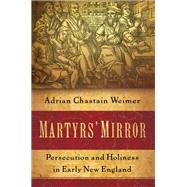Martyrs' Mirror Persecution and Holiness in Early New England
, by Weimer, Adrian Chastain- ISBN: 9780199743117 | 0199743118
- Cover: Hardcover
- Copyright: 10/10/2011
This book examines the folklore of martyrdom in seventeenth-century Protestant culture, exploring how Congregationalists, Separatists, Antinomians, Baptists, and Quakers imagined themselves within biblical and historical narratives of persecution. Memories of martyrdom, especially stories of the Protestants killed during the reign of Queen Mary in the mid-sixteenth century, were central to a model of holiness and political legitimacy. The colonists of early New England drew on this historical imagination in order to strengthen their authority in matters of religion during times of distress such as theological controversies or war. In examining how the notions of persecution and martyrdom move in and out of the sermons, letters, diaries, and poetry of the period, Weimer finds that the idea of the true church as a persecuted church infused colonial identity and articulations of difference. Congregationalists saw outsider groups as persecuting agents of Antichrist, and Antinomians, Quakers and Baptists drew courage and models from historic martyrs as they resisted Congregationalist authority. Though contested, the martyrs formed a shared heritage, and fear of being labeled a persecutor, or even admiration for a cheerful sufferer, could serve to inspire religious tolerance. The sense of being uniquely marginalized also allowed colonists to avoid responsibility for aggression against Algonquian tribes. Surprisingly, those wishing to defend maltreated Christian Algonquian wrote their history as a continuation of the persecutions of the true church. This examination of the historical imagination of martyrdom contributes to our understanding of the meaning of suffering and holiness in English Protestant culture, of the significance of religious models to debates over political legitimacy, and of the cultural history of persecution and religious liberty.






